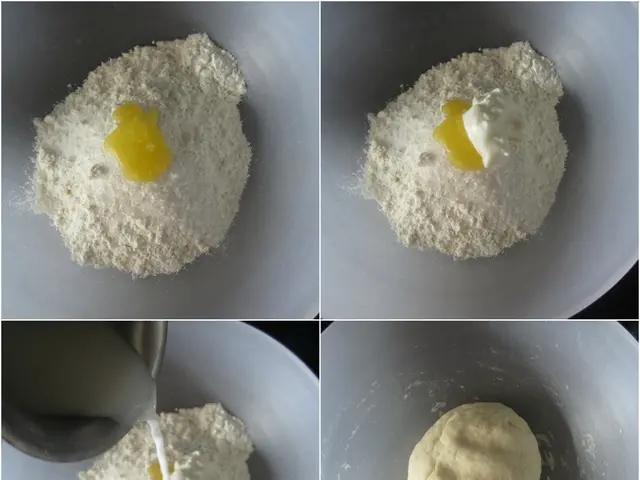The Impact of Modern Hygiene on Immune System Development: Debunking the Hygiene Hypothesis
Exploring the Validity of the Hygiene Hypothesis: A Debate
When it comes to raising a healthy child, maintaining cleanliness is crucial. But, does over-sanitizing our homes and lives actually harm our children's immune systems? Let's explore the hygiene hypothesis and how it affects our kids' immune development.
The Hygiene Hypothesis: A Complicated Statement
The hygiene hypothesis proposes that having reduced exposure to harmful germs early in life may lead to an overactive immune response, causing autoimmune diseases and allergies. Initially formulated in the late 1980s, this hypothesis emerged from the observation that children from large families or those who grew up on farms seemed less prone to allergies.
However, things have become more complex over time. As Dr. Frank Esper, a pediatric infectious disease specialist, explains, observing a pattern doesn't equate to understanding the cause. The hygiene hypothesis is still just a theory, leaving scientists hard at work trying to understand the intricate relationship between cleanliness and immune health.
Autoimmune Diseases and Allergies: Is it A Myth or Fact?
As a hypothesis, the hygiene hypothesis has not been conclusively proven or disproven. A correlation exists between fewer allergies in farm-raised children, but correlation does not imply causation. The real cause of the trend remains unknown.
Over the years, extensive research has pointed towards a shift in focus from viruses towards bacteria in our gut microbiomes. According to Dr. Esper, changes in food safety and dietary habits could be influencing our gut microbiomes, reducing the number of early childhood infections and causing immune system dysregulation.
Building a Strong Immune System: Myth or reality?
Contrary to popular beliefs stemming from the hygiene hypothesis, there's no need to sacrifice hygiene in the name of immune system development. Dr. Esper emphasizes that promoting proper cleanliness and taking steps to prevent your child from getting sick remains vital for maintaining good health.
So, how can you help your child build a strong immune system? Here are some effective strategies to support their immune system development:
- Vaccinate them: Vaccines provide a safe and effective method of training a child's immune system to recognize and defend against dangerous pathogens.
- Teach them good hygiene: Encourage proper hand washing, cough etiquette, and nail care. Good hygiene practices will limit unnecessary exposure to harmful germs.
- Feed them a balanced diet: Offer lean proteins, fresh fruits, vegetables, whole grains, healthy fats, and foods rich in pre- and probiotics. A varied diet will promote a healthy gut microbiome.
- Limit processed foods: Processed food is often high in added sugars, saturated fats, and refined grains. Reducing the consumption of such foods will help maintain your child's overall health.
- Get them moving: Regular exercise is essential for a healthy immune system. Encourage your child to engage in physical activities, such as running and playing.
- Protect their sleep: Adequate and consistent sleep is crucial for a strong immune system. Develop good sleep habits and ensure your child gets enough rest each night.
- Consider supplements: If your child seems to get sick frequently, discuss adding vitamin D and zinc supplements with their pediatrician.
In conclusion, the hygiene hypothesis sheds light on the importance of early microbial exposure in immune system development, but the relationship is still widely debated among scientists. In the meantime, promoting proper hygiene, providing a balanced diet, and ensuring your child gets adequate sleep are practical ways to support their immune health.
- Although the hygiene hypothesis suggests a link between reduced exposure to harmful germs and an overactive immune response, it remains a theory and scientists continue to search for the true cause of autoimmune diseases and allergies.
- Dr. Esper, a pediatric infectious disease specialist, suggests that changes in food safety and dietary habits could be impacting gut microbiomes, potentially leading to immune system dysregulation.
- Contrary to the implications of the hygiene hypothesis, promoting cleanliness and taking steps to prevent illnesses remains essential for maintaining good health in children.
- To support the development of a strong immune system in children, physicians recommend vaccinating them, teaching good hygiene habits, offering a balanced diet, limiting processed foods, encouraging regular exercise, ensuring adequate sleep, and in some cases, discussing supplements with the pediatrician.
- Recognizing the complexity surrounding the hygiene hypothesis, maintaining a well-rounded approach to immune health through proper hygiene, nutrition, fitness, sleep, and mental health practices will ultimately benefit the overall health and development of children.








